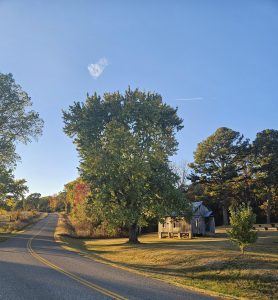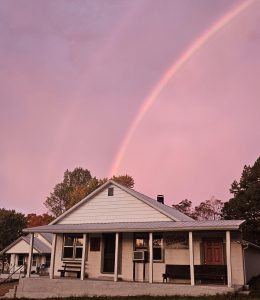Accomplishments of the MSU Libraries in the Dean Peters Era
Tom Peters served as Dean of Library Services at Missouri State University
from August 1, 2012 through December 31, 2024 (12 years and five months)
 Reflective Thoughts from Dean Peters as he prepares to retire next month: For the past twelve years it has been an honor and a privilege to serve Missouri State University (MSU) and its many diverse communities as Dean of Library Services. The overarching goal of the MSU Libraries has always been to strive to meet the information needs of the university community and the broader region.
Reflective Thoughts from Dean Peters as he prepares to retire next month: For the past twelve years it has been an honor and a privilege to serve Missouri State University (MSU) and its many diverse communities as Dean of Library Services. The overarching goal of the MSU Libraries has always been to strive to meet the information needs of the university community and the broader region.
Every library, past, present and future, begins with some sort of collection. Services and spaces for storage and use grow up around the collection. This is as true in the digital age as it was in ancient, medieval, and modern times. Everything a library does is a combination of content, services, and spaces, led by excellent library faculty and staff, utilizing current and emerging information technologies.
The MSU Libraries exists as a great third place for students, faculty, staff, and members of the general public. For every citizen-scholar, their “first place” is the place where they live – residence halls on campus, apartments near campus, etc. Their “second place” is their principal workplace – classroom, lab, office, etc.
Third places – churches, restaurants, community centers, bars, parks, libraries, etc. – fulfill another vital role in the lives of individuals, societies, and cultures. Great third places provide spaces where ideas can be explored and debated. A great third place is a comfortable and productive social space that engages individuals and groups aesthetically and intellectually, physically, emotionally, and spiritually.
Today’s and tomorrow’s library users not only find and read (or view) information, but also manipulate and enhance what they find – within the confines, of course, of laws, rules, and guidelines regarding intellectual property and fair use. Users also want to create their own content. The MSU Libraries provides services and spaces for creating and editing information objects, including the vocal booth, a one-button video studio, the Innovation Lab, and the new Digital Humanities Lab, a partnership between the Reynolds College of Arts, Social Sciences, and Humanities (RCASH) and the Library.
Library users often work in groups. The MSU Libraries supports group work in many ways, from diner booths clustered throughout the building, to schedulable small-group study rooms, to whiteboards on wheels, to zoom-enabled group spaces.
No library is an island. The MSU Libraries works closely with other cultural memory institutions (libraries, archives, museums, and various state and federal agencies) throughout the Ozarks and beyond to gather, organize, preserve, and provide access to many types of cultural objects, including a rich and growing collection of Ozarkiana, both physical and digital.
Nearly one hundred years ago, Dr. S. R. Ranganathan, the famous librarian and mathematician from India, formulated and promulgated the five laws of library science:
 Books are for use.
Books are for use.- Every person his or her book.
- Every book its reader.
- Save the time of the reader.
- A library is a growing organism.
As the MSU Libraries is poised to enter the second quarter of the twenty-first century, it is well-positioned and ready to grow, change, and develop as the world of information continues to expand and evolve.
Selective List of Major Accomplishments of the MSU Libraries, 2012 through 2024
- Renovation of Duane G. Meyer Library: In an ongoing effort that will continue after his retirement, Peters initiated and sustained a major upgrade to the spaces in Duane G. Meyer Library. The massive project includes new furnishings and carpeting, an upgraded wi-fi network, more power outlets, and newly repurposed areas, including the distinctive Living Room on the main level and the Ozarks Room on the Third Level, have been implemented. More renovations are in the planning and development stages.
- Ozarks Studies Institute: Several years ago the MSU Libraries took over the management and leadership of this longstanding institute at MSU. OzarksWatch Magazine is back on a regular publication schedule, edited well for years by Susan Croce Kelly, and soon by Rachel Kersey, and a book series on various topics related to the Ozarks was started, edited by Rachel Kersey. Numerous oral history projects have been completed, as well as many Ozarks-related digitization projects. Two massive collections of Ozarkiana, the McCann and Peyton collections, are being processed and digitized.
- First FOLIO: In the spring of 2020, during the first months of the COVID-19 global pandemic, Missouri State University Library became the first library in the world to fully implement FOLIO, a new, open-source integrated library system, which has since been adopted by the Library of Congress, the National Library of Australia, the MOBIUS consortium, and many other libraries and library consortia around the world.
- MSU Testing Center: During Peters’ time at MSU, the MSU Testing Center was consolidated, expanded, and moved to the Lower Level of Duane G. Meyer Library, under the leadership and direction of Sue McCrory. More testing providers and seats were added, equipment has been upgraded, and accommodated testing has been improved.
- Managed the MSU Libraries during the Global COVID-19 Pandemic: In the spring of 2020, as the pandemic severely affected the lives of everyone, the MSU Libraries took bold steps to support the ongoing work of teaching, learning, research, and service at the university. We used our 3D printers to make hundreds of PPE’s (Personal Protective Equipment) at a time of critical need. We make long-term loans of portable computers and mobile hotspots to students, faculty, and staff as they sheltered in place and worked remotely.
- Smithsonian Folklife Festival: MSU served as the lead organization in the multi-state Ozarks Region to plan and execute the Ozarks Program at the 2023 Smithsonian Folklife Festival, held in late June and early July on the National Mall in DC. The Ozarks Program was a big success, with over 625,000 visitors during the ten days of the festival, and over 2.2 million social media impressions during the summer months alone. An archive of recordings of many of the discussions and performances is being constructed.
 New Labs: Several exciting new labs have been created in Duane G. Meyer, including the Digitization Lab, for digitizing locally held materials, the Innovation Lab, including 3D printers, virtual reality equipment and systems, drones, and much more, a Vocal Booth for making podcasts and music demos, a one-button studio for making videos, and the new Digital Humanities Lab.
New Labs: Several exciting new labs have been created in Duane G. Meyer, including the Digitization Lab, for digitizing locally held materials, the Innovation Lab, including 3D printers, virtual reality equipment and systems, drones, and much more, a Vocal Booth for making podcasts and music demos, a one-button studio for making videos, and the new Digital Humanities Lab. - Outreach and Development: For several years now the MSU Libraries has received over $2 million annually in gifts from generous donors and supporters.
- Streamlining Efforts: During Peters’ time at MSU, the Libraries became more efficient and effective. We closed the Mountain Grove campus library, which was receiving almost no use, consolidated service points within the main Duane G. Meyer Library, and implemented other measures to streamline library operations and position the MSU Libraries for continued success.
- Increased and deepened collaboration with other cultural memory institutions active in the region, including the Springfield-Greene County Library District, the History Museum on the Square, the State Historical Society of Missouri, the Missouri Humanities Council, the National Park Service, and many others.
- Large Collections of Scholarly Content: Within the past decade, the MSU Libraries has added major collections of digital content, such as Hathi Trust and JSTOR Complete. We also have started and are building a large digital collection of MSU publications and scholarship, including masters theses. This resource is called BearWorks.
- Ozarks Jubilee Digital Collections: The Ozark Jubilee, a nationally televised weekly country music variety show that originated from Springfield from 1955 through 1960, is generally considered the most important entertainment phenomenon to happen in the Ozarks. In approximately a decade, the MSU Libraries went from having very little about the Ozark Jubilee to having one of the best collections in the world. As of late 2024, over 150 half-hour segments of the Ozark Jubilee have been digitized and are freely available only. Several major research collections, such as the Bryan T. E. Bisney Collection, and the Jubilee Backstage Collection, have been digitized and put online.